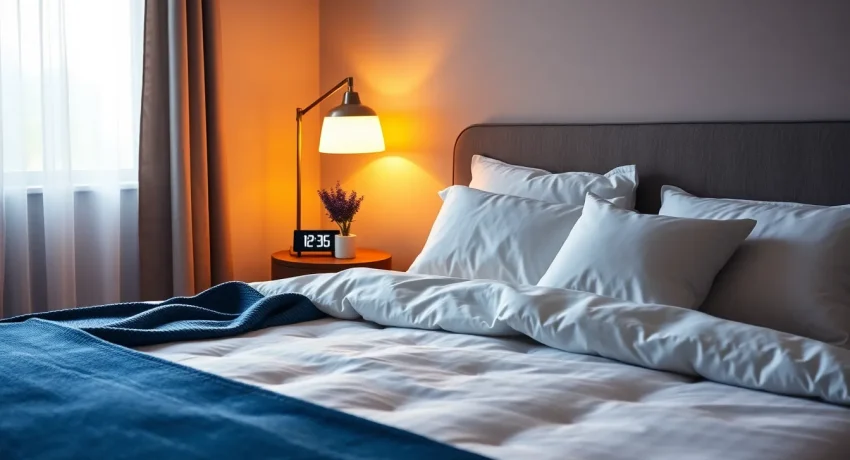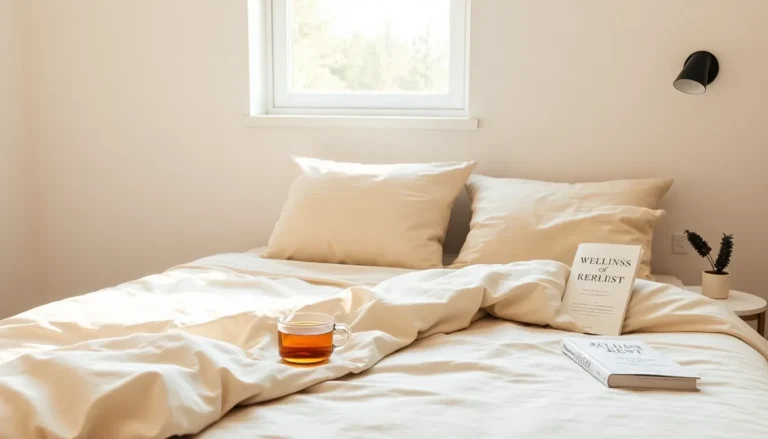Table of Contents
ToggleImagine drifting off to sleep as easily as a leaf floating on a gentle breeze. Peaceful sleep isn’t just a luxury: it’s a necessity that influences nearly every aspect of our lives. In a world filled with distractions, think ever-persistent smartphones and that never-ending to-do list, achieving a state of tranquil slumber can seem daunting. Luckily, this guide is here to show how one can cultivate peaceful sleep, helping to rejuvenate both body and soul. Let’s investigate deep into the importance of calming sleep and explore why it’s worth investing your time for those precious Zzz’s.
The Importance of Peaceful Sleep

When it comes to overall wellness, peaceful sleep stands as a pillar of health. Without quality sleep, the body struggles to repair itself, and the mind becomes foggy.
Benefits for Physical Health
A restful night impacts numerous bodily functions. It helps regulate hormones responsible for growth and appetite. Also, restful sleep is crucial for cardiovascular health. Studies have shown that those who regularly enjoy quality sleep experience lower rates of heart disease. Sleep also enhances immune function, enabling the body to fight off colds and infections more effectively. Essentially, peaceful sleep equips you to tackle life’s challenges head-on.
Benefits for Mental Well-Being
On the flip side, mental health is significantly impacted by sleep quality. Mood regulation is intricately tied to how well someone sleeps. Individuals who achieve peaceful slumber tend to report lower feelings of anxiety and depression. Also, consistent rest sharpens cognitive functions such as memory, creativity, and problem-solving skills. It appears that allowing the mind to rest and rejuvenate can have remarkable effects on daily life.
How Sleep Affects Daily Life
Sleep isn’t merely a nightly event: it plays a pivotal role in shaping daily experiences. Understanding how it relates to productivity can help one prioritize it as a fundamental part of life.
Understanding Sleep Cycles
To grasp how sleep supports daily life, one must consider sleep cycles. These cycles consist of multiple stages, from light dozing to deep sleep. Each cycle lasts about 90 minutes and repeats several times during the night. During deep sleep stages, the body engages in essential recovery processes while REM sleep fuels creativity and emotional resilience. Not recognizing these cycles could lead someone to wake up feeling groggy and unrefreshed, impacting their day ahead. Hence, aiming for a complete 7 to 9 hours of quality slumber strengthens overall daily functioning.
Common Sleep Disorders
Sleep disorders can wreak havoc on an otherwise peaceful existence. For many, discovering the specific disorder is the first step toward relief.
Natural Remedies for Better Sleep
Fortunately, various natural remedies can help people who struggle with sleep. Herbal teas like chamomile can ease the mind and prepare the body for rest. Similarly, aromatherapy with lavender essential oils is known to promote relaxation. Mindfulness practices such as meditation or gentle yoga sessions can also help clear the mind of intrusive thoughts, making it easier to drift into sleep.
Creating a Sleep-Friendly Environment
Also, crafting a sleep-friendly environment is key. A cool, dark room often sets the stage for quality sleep. Investing in comfortable bedding, reducing noise pollution, and eliminating screen time at least an hour before bed creates an ambiance conducive to winding down. Personalizing one’s sleep environment helps signal to the body that it’s time to relax.
Sleep Hygiene Practices
Practicing good sleep hygiene can transform one’s relationship with sleep. These practices act like a warm blanket for the mind, encouraging restfulness.
Relaxation Techniques for Improved Sleep
Relaxation techniques can be particularly effective in enhancing sleep quality. Progressive muscle relaxation, where one tenses and then relaxes each muscle group, helps release built-up tension. Simple breathing exercises can ground individuals, allowing them to enter a tranquil state before bedtime. With the multitude of strategies available, finding the right combination can lead to a peaceful slumber.




